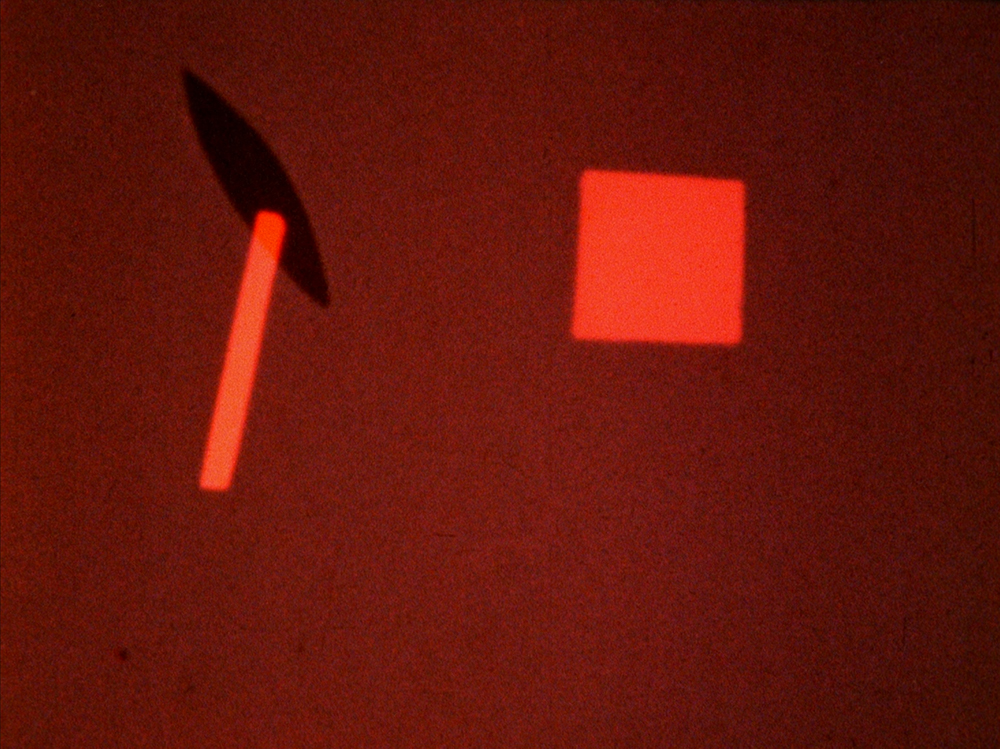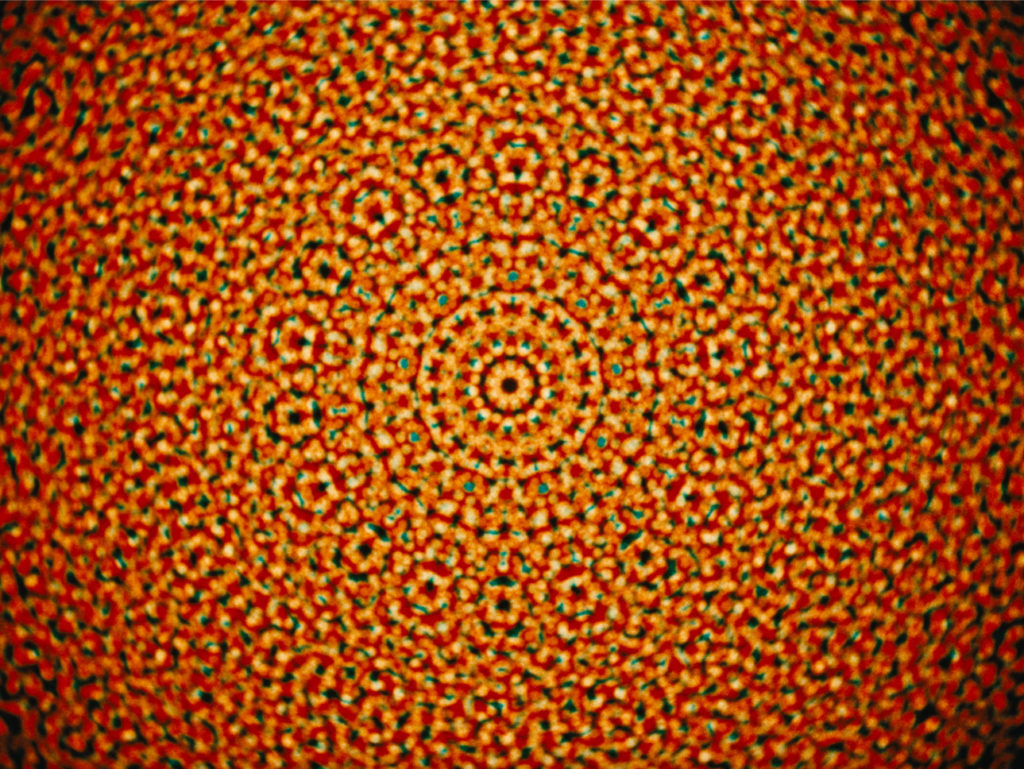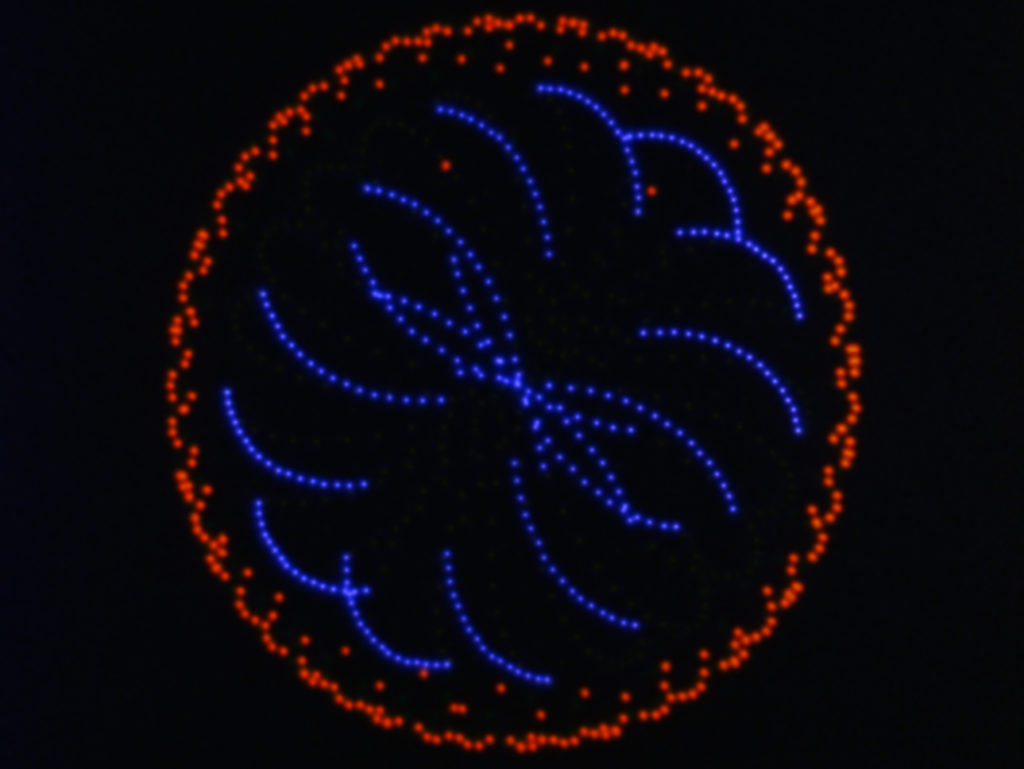New Artist Members: John and James Whitney
Posted March 14th, 2023 in Announcements, New Acquisitions, New Films, News / Events

Photo courtesy of Whitney Editions™, Los Angeles, CA.
Canyon Cinema is thrilled to welcome the films of John and James Whitney to the collection!
John Whitney (1917-1995) is considered one of the fathers of computer animation. His works include the opening title sequence from Alfred Hitchcock’s film Vertigo (1958), which is a collaboration work with Saul Bass; Catalogue (1961), assembled record of visual effects using a mechanical analog computer of his own invention; and Arabesque (1975), a pinnacle of his digital films. John and his brother James were first-prize winners at the First International Experimental Film Competition, Belgium, in 1949. In the years 1947-48, John was awarded a two-year John Simon Guggenheim Fellowship permitting an in-depth study of composing music with graphics. In 1952, John founded Motion Graphics, Inc., to develop commercial productions exploiting the mechanical analog processes.
James Whitney (1921-1982) studied painting and traveled in England before World War II. James completed seven short films over four decades and collaborated with his brother John for some of his film work. The first of the brothers’ films was Twenty-Four Variations on an Original Theme. Its structure was influenced by Schoenberg’s serial principles. James and John created their series of Five Film Exercises between 1943 and 1945, for which they won first prize at the 1949 Brussels Experimental Film Competition. In 1946, the brothers traveled to the San Francisco Museum of Museum Art to show their films at the first of ten annual Art in Cinema festivals. James spent three years working on the 8mm film Variations on a Circle (1942), which lasts some 20 minutes. Then, he became more involved in spiritual interests such as Jungian psychology, alchemy, yoga, Tao, and Krishnamurti. These interests heavily influenced his later work. Between 1946 and 1957, Yantra was produced entirely by hand. By punching grid patterns in 5″ by 7″ cards with a pin, James was able to paint through these pinholes onto other 5″ x 7″ cards, to create images of rich complexity and give the finished work a very dynamic and flowing motion. Analogue computer equipment developed by brother John, allowed James to complete Lapis (1965) in seven years. He drew dot patterns again for this film, but the camera and artwork were positioned using computer control, allowing each image to be overlaid from multiple angles. In this piece, smaller circles oscillate in and out in an array of colors, accompanied by Indian sitar music. The patterns become hypnotic and trance-inducing. The two following films Dwija (1973) and Wu Ming (1977) intended to form a quartet with the two last ones: Kang Jing Xiang and Li, which remained incomplete when James died in 1982.
Six films from John and James Whitney are now available for rent from Canyon Cinema, including:

Five Film Exercises – No. 1 (John Whitney and James Whitney, 1943, 5 minutes, color, sound, 16mm)
The Whitney’s Five Film Exercises “are visually based on modernist composition theory… the carefully varied permutations of form are manipulated with cutout masks so that the image photographed is pure, direct light shaped, rather than the light reflected from drawings as in the traditional animation… The eerie, sensuous neon glow of these forms is paralleled by pioneer electronic music sound scores composed by the brothers using the pendulum [instrument they innovated] to write sounds directly on the film’s soundtrack area, with precisely controlled calibrations [a variable area sound track]. At that time, before the perfection of recording tape, these sounds, with exotic ‘pure’ tone qualities, mathematically even chromatic glissandos and reverberating pulsations – were truly revolutionary and shocking.” – William Moritz, from Robert Haller (ed.), First Light (New York: Anthology Film Archives, 1998)
Unpublished work copyright 1943, John and James Whitney
Restoration copyright 2018, Whitney Editions, LLC
Restored by the Academy Film Archive

Five Film Exercises – No. 2-3 (John Whitney and James Whitney, 1944, color, sound, 4 minutes, 16mm)
Unpublished work copyright 1944, John and James Whitney
Restoration copyright 2018, Whitney Editions, LLC
Restored by the Academy Film Archive

Five Film Exercises – No. 4 (John Whitney and James Whitney, 7 minutes, 1944, color, sound,16mm film,)
Unpublished work copyright 1944, John and James Whitney
Restoration copyright 2018, Whitney Editions, LLC
Restored by the Academy Film Archive

Five Film Exercises – No. 5 (John Whitney and James Whitney, 1945, color, sound, 4 minutes, 16mm)
Unpublished work copyright 1945, John and James Whitney
Restoration copyright 2018, Whitney Editions, LLC
Restored by the Academy Film Archive

Lapis (James Whitney, 1963-1966, 10 minutes, color, sound, 16mm)
James Whitney’s Lapis is a classic work of abstract cinema, a 10-minute animation that took seven years to create using mechanical analogue computer equipment. In this piece, smaller circles oscillate in and out in an array of colors evoking a metaphysical meditation while being accompanied by Indian sitar music. The patterns become hypnotic and trance-inducing. This work clearly correlates the auditory and the visual and is a wonderful example of the concept of personal abstract filmmaking.
Unpublished work copyright 1966, James Whitney
Restoration copyright 2018, Whitney Editions, LLC

Permutations (John Whitney, 1968, 8 minutes, color, sound, 16mm)
Abstract computer animation consisting of kinetic complexes of ever-changing patterns of dots.
“In Permutations, each point moves at a different speed and moves in a direction independent according to natural laws’ quite as valid as those of Pythagoras, while moving in their circular field. Their action produces a phenomenon more or less equivalent to the musical harmonies. When the points reach certain relationships (harmonic) numerical to other parameters of the equation, they form elementary figures.” – John Whitney
Music: Balachandra
Unpublished work copyright 1968, John Whitney
Restoration copyright 2018, Whitney Editions, LLC
Restored by the Academy Film Archive


